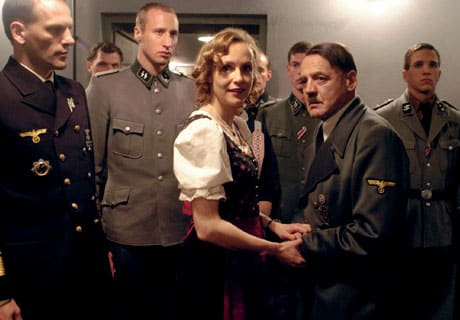Prior to Downfall, there was exactly one German film about Hitler: 1952's The Last Act. This should be taken as an indicator of how difficult it is for Germany to deal with its Nazi past. Director Oliver Hirschbiegel and writer/producer Bernd Eichinger confront the past head on with an epic portrayal of the last days of Hitler during the fall of Berlin.
Downfall is adapted from two books: Dr. Joachim Fest's Inside Hitler's Bunker and Traudl Junge's Until the Final Hour: Hitler's Last Secretary. Junge is the film's protagonist and it is her experience as Hitler's personal secretary that drives the film's narrative.
The characters in the bunker should be known to everyone: Hitler, his mistress Eva Braun, Heinrich Himmler, Joseph and Magda Goebbels, Albert Speer and many other leading characters and bit players in the Nazi hierarchy. Less known is how Hitler's megalomania extended right up to his death and how so many remained loyal, following him in a course of political and military suicide. Hitler could've surrendered, or at least abandoned Berlin, thereby saving untold civilian lives, but practical matters, such as the deaths of German citizens, were easily trumped by Fascist ideals.
The portrayals are restrained but maintain a slightly theatrical conventionality. This offers some emotional distance to the audience and may explain how, given the subject matter and 148-minute running time, it isn't a gruelling film to watch.
Bruno Ganz brings his puppy dog eyes to the role of the Fuhrer and it is this depiction, like so many others in the film, that is disturbing. We see the Nazis' evil, sometimes appearing as a psychosis fuelled by a horrible ideology, other times as base self-interest. But we also see dignity and isolated compassion. Downfall shows us the complexities and seductions of the Nazis and of evil itself, a lesson that young Traudl Junge learned, by her own admission, too late. (Alliance Atlantis)
Downfall is adapted from two books: Dr. Joachim Fest's Inside Hitler's Bunker and Traudl Junge's Until the Final Hour: Hitler's Last Secretary. Junge is the film's protagonist and it is her experience as Hitler's personal secretary that drives the film's narrative.
The characters in the bunker should be known to everyone: Hitler, his mistress Eva Braun, Heinrich Himmler, Joseph and Magda Goebbels, Albert Speer and many other leading characters and bit players in the Nazi hierarchy. Less known is how Hitler's megalomania extended right up to his death and how so many remained loyal, following him in a course of political and military suicide. Hitler could've surrendered, or at least abandoned Berlin, thereby saving untold civilian lives, but practical matters, such as the deaths of German citizens, were easily trumped by Fascist ideals.
The portrayals are restrained but maintain a slightly theatrical conventionality. This offers some emotional distance to the audience and may explain how, given the subject matter and 148-minute running time, it isn't a gruelling film to watch.
Bruno Ganz brings his puppy dog eyes to the role of the Fuhrer and it is this depiction, like so many others in the film, that is disturbing. We see the Nazis' evil, sometimes appearing as a psychosis fuelled by a horrible ideology, other times as base self-interest. But we also see dignity and isolated compassion. Downfall shows us the complexities and seductions of the Nazis and of evil itself, a lesson that young Traudl Junge learned, by her own admission, too late. (Alliance Atlantis)
